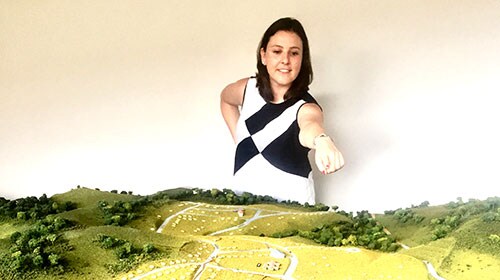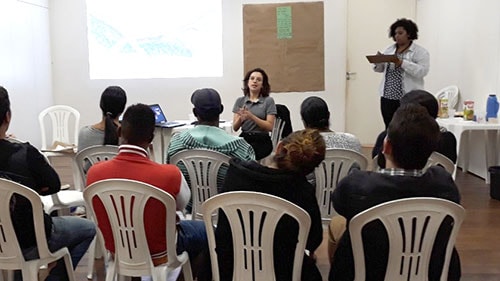15 marzo 2019
Why is gender important in resettlement?
In the state of Minas Gerais, Brasil, three highly-experienced professional women spend much of their time on ensuring gender is always front-of-mind at work. They all have key roles in the resettlement process taking place following the Samarco dam failure in Brasil.
Fernanda Lavarello is a BHP secondee to the Renova Foundation’s resettlement social team; Patricia Lois, manages all aspects of the resettlement project for Renova; and Larissa Pedroso is an architect coordinating a team working with individual families to design their new homes. The resettlement is more than just a job for all three and their commitment to ensure women are heard and empowered during the project is evident.
Being forced to resettle is incredibly difficult for anyone and yet some people can be more disadvantaged than others. Special attention needs to be paid to vulnerable people to address their needs, avoid additional adverse impacts and help them to restore their lives.
Women and girls, who often have primary domestic responsibilities and livelihoods derived from local subsistence, spend much of their time in and around their homes. The loss of their home, disruption to daily lives and social connections can be particularly devastating for them.
The Renova Foundation has skilled staff with a strong presence of women. Even so, a recent expert review of the project to date highlighted that Renova could do more in the area of gender. It was found that while some affected women have participated, and even played a key leadership role in the process, involvement could be improved.
Fernanda agrees, “Gender balance is a challenge as the community leaders in the area are typically men. Renova is strengthening is gender sensitive approach to ensure a greater consideration of women´s voices”. Similarly, while Larissa and her team fully understand the importance of women as transforming agents, they also need to be constantly aware of the patriarchal society in which they operate. “Our aim is to create a safe and welcoming environment to promote gender equality”, she says.
Patricia faces other gender challenges. Her team, numbering over 600 people is dominated by construction workers, only 10% of whom are female. Patricia believes that women make excellent engineers due to their strong personal skills complemented by their capacity to plan and multi-task, and she is an exemplary role model.
All three women are incredibly important to the resettlement project, which is much more than a housing construction. It is their understanding of gender as part of the social process that will help deliver sustainable and equitable outcomes for men, women and young people, long after the houses are built.
Fernanda Lavarello
BHP Brasil´s Fernanda Lavarello has been working in the Renova Foundation as a full time secondee in the Resettlement Program since September 2017. Her qualifications in psychology and project management and substantive experience in managing social programs in Brazil and Southern Africa (Mozambique and Angola) positioned her well for this role. However she says `It is the first time that I have worked in such a controversial environment and with a community directly impacted by a disaster.´
Fernanda has been working alongside over 200 impacted families, their technical assistance organisations, Public Prosecutors and local government and regulators through a participatory process. To date, key achievements have included the design of a set of principles to guide the resettlement; the participatory selection of new locations for the communities; development of urban plans; and the architectural design of the new homes.
Fernanda enjoys the fact that every day presents new challenges which it turn provides endless learning opportunities. The goal to successfully rebuild communities and restore livelihoods is not an easy one to achieve and the complex operating environment can be overwhelming. Despite the difficulties, Fernanda says that she is grateful for the opportunity to contributing to people´s lives and takes comfort from the positive feedback from community members.
As a woman, Fernanda pays close attention on how the resettlement process impacts on gender. She says “It is crucial hear the different opinions from both men and women during the resettlement process. Gender balance is a challenge as the community leaders in the area are typically men. Renova is strengthening is gender sensitive approach to ensure a greater consideration of women´s voices”.
Fernanda´s hope for the communities is that they remain resilient and do not give up of the participatory process, that they manage to adapt to their lives in the new homes and their livelihoods are restored in a sustainable way.
To recognise Fernanda’s personal contribution to the resettlement process, she was invited to participate in the BHP HSEC Awards program in Melbourne in February.

Patricia Lois
Patricia Lois shoulders a heavy responsibility these days. She is an incredibly strong woman, but she needs to be, because her role in the Renova Foundation is to manage around 600 people (employees and contractors) to deliver the resettlement program. Her team is building the three new communities comprising 240, 140 and 40 homes, as well as another 55 families which are deemed to receive new houses along with all the associated infrastructure and services.
However this is not just an ordinary housing development. It is an integrated project which, in addition to the planning, engineering, construction and licencing teams also includes the social participation team. Of this large workforce, only 10% are women.
But as an engineer, the gender imbalance is not new to Patricia. She is convinced that women make good engineers, because they typically have a great combination of skills – planning and multi-tasking, inquisitive, a natural intuitive sensibility and empathy. Despite this fact Patricia says that she constantly needs remind herself that she deserves respect. She does not allow being a woman become a disadvantage. She says that she sets high expectations for herself and is also demanding of the workforce.
Patricia’s passion and commitment to the project are undeniable. Despite the sadness associated with the disaster, she expresses gratitude for being chosen for this mission. She has been in her profession for 30 years and experienced many challenging times throughout her life, and she finds motivation in the magnitude of this role.
She enjoys working together with a motivated team. She says that performance management of every individual is critical to ensure obstacles are overcome, the objectives of the project are achieved and learnings are transformed into opportunities. She is also a strong believer in the importance of open dialogue to strengthen the work of her cross-sectoral work teams.
When asked how she manages all the pressure of this role she responds by saying that she constantly practices putting herself in the place of others and finds self-knowledge and self-evaluation hugely important. These tools help her to guide her emotions and overcome the inevitable frustrations.
To balance the sacrifice she makes of leaving the family and the comfort of her home in Nova Lima during the week, she maintains her own wellbeing by seeking spiritual enhancement and prioritises time for family and social life.

Larissa Pedroso
Larissa Pedroso has the role of coordinating – together with her peer Daniele Alves, the Conceptual Project team, a group of 18 female and 4 male architects working directly with families to develop the drawings and plans for the houses in the Bento Rodrigues resettlement.
Larissa says that this project is very different to previous ones on which she has worked. “The unique context, size of the resettlement and interface with many different actors make the work much more complex. The urgency of resettling families is also significant.
“The biggest challenge is to establish the most participatory process possible in the maximum time available. The participation of various actors, such as the Renova Foundation, families, governments and technical assistants brings legitimacy to the process. However the longer it takes for families to be resettled, more painful it will be for them, resulting in a process that is less ideal.
The profile of the impacted people varies greatly - young, old, families only of women, or men; people with higher education or little formal education, so the process needs to be adaptable and flexible. A variety of tools are used to understand people's desires and help them visualise their homes, backyards, shops, etc. The architects themselves need to pay special attention to the human aspects of their work to build trust. They must have respect for people’s choices and not impose their vision and culture.
“We understand the important role of women as transforming agents but every day we face the issue of patriarchy that is ever present in our society. Our aim is to create a safe and welcoming environment for discussion so that we can unite to promote gender equality.
Despite the many challenges, Larissa says that the social aspect makes the work rewarding and she feels that it is a privilege to be part of it. She says that she tries hard not lose sight of the true meaning and purpose of the work and finds the opportunity to deliver what is best for the families hugely motivating. Larissa says that when the families visit their new allotment of land for the first time is their moment of greatest satisfaction.
And what to the impacted people want for their future? Larissa says they long to have the tranquillity of their lives back. They want to be in their new homes as fast as possible, to feel that they belong where they live.

